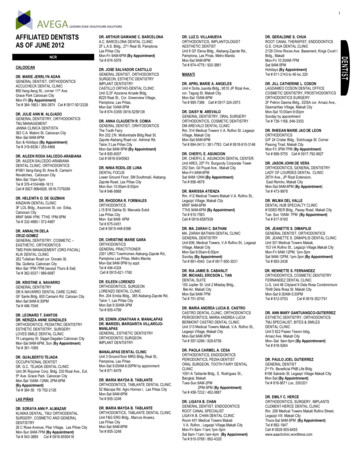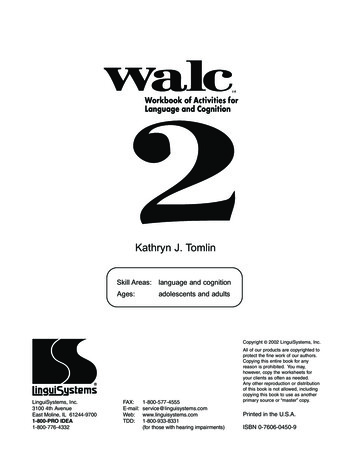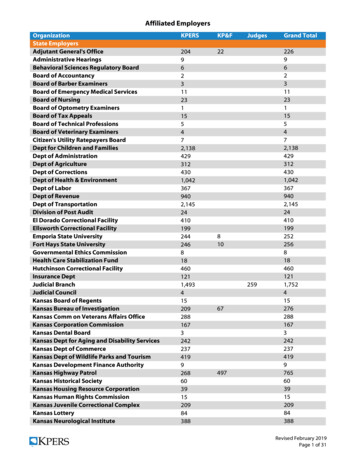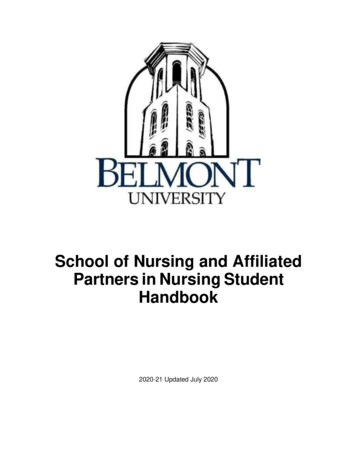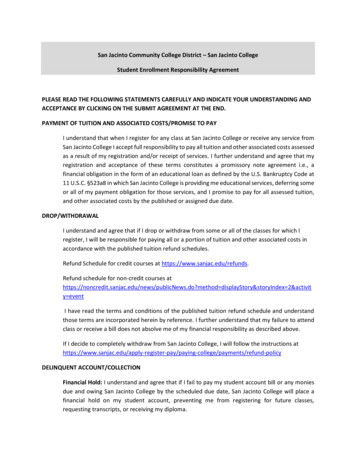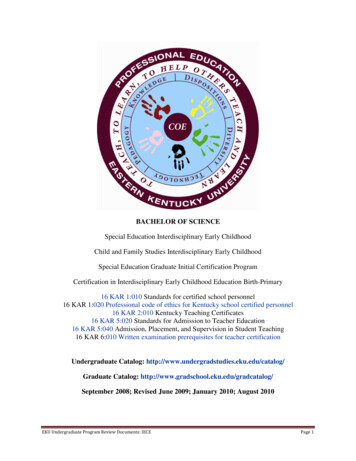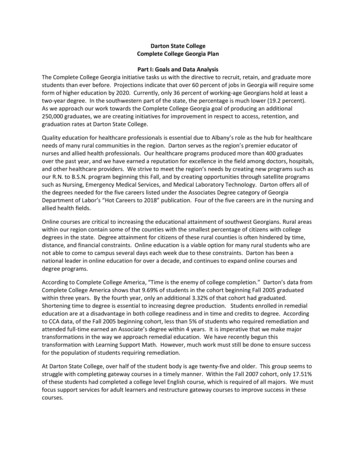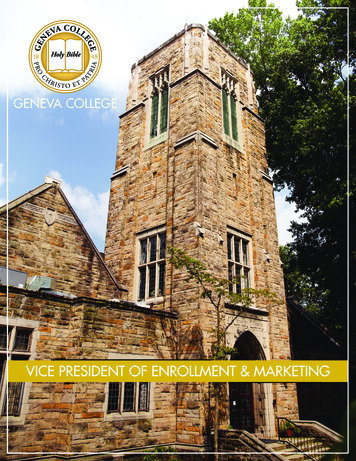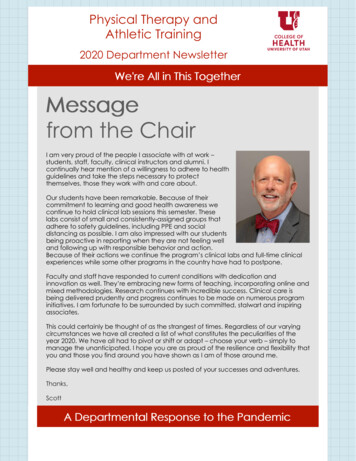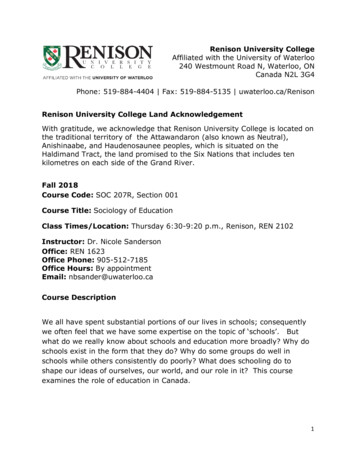
Transcription
Renison University CollegeAffiliated with the University of Waterloo240 Westmount Road N, Waterloo, ONCanada N2L 3G4Phone: 519-884-4404 Fax: 519-884-5135 uwaterloo.ca/RenisonRenison University College Land AcknowledgementWith gratitude, we acknowledge that Renison University College is located onthe traditional territory of the Attawandaron (also known as Neutral),Anishinaabe, and Haudenosaunee peoples, which is situated on theHaldimand Tract, the land promised to the Six Nations that includes tenkilometres on each side of the Grand River.Fall 2018Course Code: SOC 207R, Section 001Course Title: Sociology of EducationClass Times/Location: Thursday 6:30-9:20 p.m., Renison, REN 2102Instructor: Dr. Nicole SandersonOffice: REN 1623Office Phone: 905-512-7185Office Hours: By appointmentEmail: nbsander@uwaterloo.caCourse DescriptionWe all have spent substantial portions of our lives in schools; consequentlywe often feel that we have some expertise on the topic of ‘schools’. Butwhat do we really know about schools and education more broadly? Why doschools exist in the form that they do? Why do some groups do well inschools while others consistently do poorly? What does schooling do toshape our ideas of ourselves, our world, and our role in it? This courseexamines the role of education in Canada.1
Course Objectives and Learning OutcomesUpon completion of this course, students should be able to:a) describe the historical development of educational systems.b) outline the theoretical foundations of sociology of education.c) identify the role that education plays in perpetuating or challengingsocial norms.d) explain the methods used by sociologists to identify, analyze, andcritique various educational debates and paradigms.e) outline the steps involved in developing and writing a research paperproposal.f) describe the process by which a research proposal is converted into aresearch paper.Required Text:Davies, S., & Guppy, N. (2018). The schooled society: An introduction tothe sociology of education (4th ed.). Toronto, ON: Oxford UniversityPress.Readings:Week 1 (Sept. 6th)Required Reading:Davies & Guppy – CHAPTER 1 Required TextRecommended Readings:Baker, D. (2014). The schooled society: The educational transformation ofglobal culture. Redwood City, CA: Stanford University Press. LusiWong Library Reading ReserveOsborne, K. (1999). Why do we have public schools? A guide to theCanadian school debate (pp. 3-12). Toronto, ON: Penguin Group.Lusi Wong Library Reading ReserveRobson, K.L. (2013). A historical overview of education in Canada (Chapter3). In Sociology of education in Canada (pp. 54-87). Don Mills, ON:Pearson Canada Inc. Lusi Wong Library Reading Reserve2
Wotherspoon, T. (2009). Historical dimensions of Canadian education. Thesociology of education in Canada (pp. 54-74). Don Mills, ON: OxfordUniversity Press. Electronic ReservesWeek 2 (Sept. 13th)Required Reading:Davies & Guppy – CHAPTER 2 Required TextRecommended Reading:Saha, L. (2008) Sociology of education. In T. Good (Ed.), 21st centuryeducation: A reference handbook (pp. 299-308). Thousand Oaks, CA:Sage Publication, Inc. Electronic ReservesWeek 3 (Sept. 20th)Required Reading:Davies & Guppy – CHAPTER 3 Required TextWeek 4 (Sept. 27th)Required Reading:Davies & Guppy – CHAPTER 4 Required TextRecommended Reading:Robinson, K., & Aronica, L. (2015). Creative schools: The grassrootsrevolution that’s transforming education. New York: Penguin Books.Lusi Wong Library Reading ReserveWeek 5 (Oct. 4th)Required Reading:Davies & Guppy – CHAPTER 5 Required Text3
Recommended Readings:Solberg, P. (2015). Finnish lessons 2.0: What can the world learn fromeducational change in Finland? New York: Teachers College Press.Lusi Wong Library Reading ReserveUngerleider, C. & Burns, T. (2015). The state and quality of Canadianpublic elementary and secondary education. In D. Rapheal (Ed.),Social determinant of health: Canadian perspective, third edition (pp.240-260). Toronto, ON: Canadian Scholars’ Press Inc. ElectronicReservesNo Class on October 11thWeek 6 (October 18th)Required Reading:Davies & Guppy – CHAPTER 6 Required TextRecommended Reading:Clooney, D., Cleveland, G., Hattie, J., & Tayler, C. (2016). Variations in theavailability and quality of early childhood education and care bysocioeconomic status of neighborhoods. Early Education andDevelopment, 27 (3), 384-401. Electronic ReservesLehmann, W. (2016). Influences on working-class students’ decisions to goto university. In A. Stich & C. Freie (Eds.), The working classes andhigher education: Inequality of access, opportunity and outcome (pp.13-29). New York: Routledge. Electronic ReservesPetitclerc, A., Côté, S., Doyle, O., Burchinal, M., Herba, C., DaaeZachrisson, H., Boivin, M., Tremblay, R.E., Tiemeier, H., Jaddoe, V., &Raat, H. (2017). Who uses early childhood education and careservices? Comparing socioeconomic selection across five westernpolicy contexts. International Journal of Child Care and EducationalPolicy, 11 (3), 1-24. Electronic Reserves4
Week 7 (October 25th)Required Reading:Davies & Guppy – CHAPTER 7 Required TextRecommended Readings:Gilham, C.M., & Tompkins, J. (2016) Inclusion reconceptualized: PreService teacher education and disability studies in education. CanadianJournal of Education 39 (4 ), 1-25. Electronic ReservesGuppy, N. & Luong, N. (2015). The rise and stall of Canada's gender-equityrevolution. Canadian Review of Sociology/Revue Canadienne deSociologie, 52 (3), 241–265. Electronic ReservesLarkin, J., Flicker, S., Layne, C., Schwartz, A., Travers, R., Pole, J., & Gutta,A. (2017). The Ontario sexual health education update: Perspectivesfrom the Toronto teen survey (TTS) youth. Canadian Journal ofEducation, 40 (2), 1-24. Electronic ReservesMalins, P. (2016). How inclusive is “inclusive education” in the Ontarioelementary classroom?: Teachers talk about addressing diverse genderand sexual identities. Teaching and Teacher Education, 54, 128–138.Electronic ReservesMcCrimmon, A.W. (2015). Inclusive education in Canada issues in teacherpreparation. Intervention in School and Clinic, 50 (4), 234-237.Electronic ReservesRayside, D. (2014). The inadequate recognition of sexual diversity byCanadian schools: LGBT advocacy and its impact. Journal of CanadianStudies, 48 (1), 190-225. Electronic ReservesRezai-Rashti, G., Segeren, A., & Martino, W. (2016). The new articulation ofequity education in neoliberal times: The changing conception of socialjustice in Ontario. Globalisation, Societies and Education, 15 (2), 160174. Electronic ReservesSokal, L., & Katz, J. (2015), Oh, Canada: Bridges and barriers to inclusion inCanadian schools. Support for Learning, 30 (1), 42–54. ElectronicReserves5
Somma, M. (2018). From segregation to inclusion: Special educators’experiences of change. International Journal of InclusiveEducation, DOI: 10.1080/13603116.2018.1464070. ElectronicReservesSyme Anderson, H. (2016). Feminism in Canadian educational contexts: Aliterature review. Canadian Journal for New Scholars in Education, 7(2), 37-46. Electronic ReservesWeiler, M. (2017). Public servant schools in Canada: A concept forreconciliation. The Canadian Journal for the Study of Adult Education,29 (2), 1-20. Electronic ReservesWeek 8 (November 1st)Required Reading:Davies & Guppy – CHAPTER 8 Required TextWeek 9(November 8th)Required Readings:Davies & Guppy – CHAPTER 9 Required TextDrake, M. & Savage, M.J. (2016). Negotiating accountability and integratedcurriculum from a global perspective. International Journal ofLearning, Teaching and Educational Research, 15 (6), 127-144.Electronic ReservesRecommended Readings:Fine-Meyer, R. & Llewellyn, K. (2018). Women rarely worth of study: Ahistory of curriculum reform in Ontario Education. Historical Studies inEducation, 30 (1), 54-68. Electronic ReservesOsborne, K. (1999). What is a curriculum? A guide to the Canadian schooldebate (pp. 31-62). Toronto, ON: Penguin Group. Lusi WongLibrary Reading ReserveRobson, K.L. (2013). The role of curriculum (Chapter 5). In Sociology ofeducation in Canada (pp.122-159). Toronto: Pearson Canada Inc.Lusi Wong Library Reading Reserve6
Week 10 (November 15th)Required Reading:Davies & Guppy- CHAPTER 10 Required TextRecommended Readings:Bascia, N., & Maton, R. (2016). Teachers’ work and innovation in alternativeschools. Critical Studies in Education, 57 (1), 131-141. ElectronicReservesLivingstone, D.W. (2018). Tipping point for teachers? Changing workingconditions and continuing learning in a ‘knowledge economy’.International Journal of Lifelong Education, 37 (3), 359-371.Electronic ReservesWeek 11 (November 22nd)Required Readings:Davies & Guppy- CHAPTER 11 Required TextRecommended Readings:Arai, A.B. (2000). Reasons for home schooling in Canada. Canadian Journalof Education, 25 (3), 204-217. Electronic ReservesBascia N., & Maton, R. (2017) Curriculum development in alternativeschools: What goes on in alternative schools stays in alternativeschools. In N. Bascia, E. Fine, & M. Levin, (Eds.), Alternativeschooling and student engagement (pp. 3-10). New York: PalgraveMacmillan, Cham. Electronic ReservesBennett P.W. (2017) Digital learning in Canadian K-12 schools: A reviewof critical issues, policy, and practice. In A. Marcus-Quinn, & T.Hourigan (Eds.), Handbook on digital learning for K-12 schools.Springer, Cham. Electronic ReservesBhopal, K., & Myers, M. (2018). Home schooling and home education.London: Routledge.7
Blokhuis, J.C. (2010). “Write these laws on your children” by RobertKunzman. Theory and Research in Education, 8 (3), 322-326.Electronic ReservesBosetti, L., Van Pelt, D., & Allison, D.J. (2017). The changing landscape ofschool choice in Canada: From pluralism to parental preference?Education Policy Analysis Archives, 25(38).http://dx.doi.org/10.14507/epaa.25.2685 This article is part of theSpecial Issue on School Diversification and Dilemmas Across Canada,guest edited by Ee-Seul Yoon & Christopher Lubienski. ElectronicReservesBosetti, L. & Gereluk, D. (2016). Introduction. In Understanding schoolchoice in Canada (pp. 3-14). Toronto, ON: University of Toronto Press.Electronic ReservesKunzman, R. (2009). Write these laws on your children: Inside the world ofconservative Christian homeschooling. Boston, MA: Beacon Press.Lusi Wong Library Reading ReserveLubienski, C. & Yoon, E. (2017). How do marginalized families engage inschool choice in inequitable urban landscapes? A critical approach.Education Policy Analysis Archives, 25 (42).http://epaa.asu.edu/ojs/article/view/2655 This article is part of theSpecial Issue on School Diversification and Dilemmas Across Canada,guest edited by Ee-Seul Yoon & Christopher Lubienski. ElectronicReservesLubienski, C., & Yoon, E. (2017). Introduction to the special issue: Studyingschool choice in Canada. Education Policy Analysis Archives, 25(36).http://dx.doi.org/10.14507/epaa.25.3012. This article is part of theSpecial Issue on School Diversification and Dilemmas Across Canada,guest edited by Ee-Seul Yoon & Christopher Lubienski. ElectronicReservesMandazi, M. (2015). What happened to charter schools in Canada? Equity& Excellence in Education, 48 (1), 105-117. Electronic ReservesVan Pelt, D., & Bosetti, L. (2017). What the United States can learn fromCanada's experience with home schooling. In R.A. Fox & N.K.Buchanan (Eds.), The Wiley handbook of school choice. Hoboken, NJ:John Wiley & Sons Inc.8
Week 12 (November 29th)Required Reading:Davies & Guppy - CHAPTER 12 and 13 Required TextReading Expectations:I will not assign extra class readings, so all that will be required of you arethe readings found on this syllabus. The more prepared you are with thereadings, the more prepared you will be to participate.In addition to the required weekly readings, I have included somerecommended readings that give you additional insight into currenteducational debates and research being conducted in Canada.Thesereadings highlight how the everyday lives of students, teachers, parents,and other educational stakeholders can be examined through a sociologicallens.The course’s required textbook can be purchased through the University ofWaterloo Bookstore. Other required and recommended readings can beaccessed via the electronic course reserve via LEARN and others have beenput on short term reserve (3 hours) at the Lusi Wong library under thecourse number.Course Requirements and AssessmentAssessmentQuiz 1-10 (each quiz worth 2%)Assignment 1 – Research ProposalAssignment 2 – Research PaperClass Each student will complete 10 on-line quizzes (worth 2% each). Quizzes areto be completed on “LEARN” by 5:30 p.m. on the day class meets on Weeks2-11 and are based on the “required readings” for each week. Each quizconsists of ten questions in either a multiple choice or true and false format.9
Assignment 1 – Research Paper ProposalEach student will submit a max 4- page, double-spaced, 12-point font,research proposal describing a Canadian educational topic of their choiceand a proposed sociological theory that will be used to for the final researchpaper for this class. Please email your research topic to the instructor byTuesday, September 18th. The assignment will be discussed in class onSeptember 20th and we will do some preliminary work on honing ourresearch questions and thesis statements.Some possible topic examples: Education inequalities for rural studentsGrowth of private school optionsHome-schoolingEarly childhood educationAboriginal educationSex educationReligious schoolsGender and educationAfrocentric/Black-focused schoolsDuring the second half of class time on October 18th, we will be doing apeer review exercise with your draft research paper proposals. Pleaseensure that you bring a paper copy of your draft research paper proposal toclass on this day.The research proposal is due on Oct. 21st. Please post it in the LEARNdrobox as a .docx or .pdf file by 11:59 p.m.Evaluation: Refer to assessment rubric on LEARNAssignment 2 – Research PaperThe final essay research paper will build upon your research proposal andwill consist of 8-10 pages using 12-point font. The essay will requireextensive library research into an issue concerning the sociology ofeducation literature. You will have received detailed feedback on yourresearch proposal, which ought to help steer you in more productivedirections if you strayed off your topic. You are expected to take thisfeedback into consideration when writing the final paper.10
Components: A separate title page with title, name, course name, number, and date. Include “in-text” citations and a reference list in APA style. Citationsmust be correctly formatted. A minimum of 10 references is required to adequately explore thevarious dimensions of your chosen topic. Students are expected to cite from a wide range of sources such ascourse readings, books, scholarly journals, research reports (e.g. fromteachers’ federations and/or public policy organizations, governmentdocuments, archive collections, and reputable electronic sources (thisexcludes commercial sites, Wikipedia, blogs, forums, and personal electronicsources). Students are expected to use electronic indexes and databases,especially ERIC and Sociological Abstracts.The research paper is due on November 30th. Please post it in the LEARNdropbox as a .docx or .pdf file by 11:59 p.m.Note: Please bring a paper copy of your draft research paper to class onNovember 22nd. We will use the second half of class to conduct a peerreview exercise of the papers.Evaluation: Refer to assessment rubric posted on LEARN.Class ParticipationThere are two modes of participation evaluation in this course. The firstevaluation will be based on class attendance and is worth 5% of your finalmark. People have differing degrees of comfort participating in large orsmall group discussions. For this reason 5% of your grade is in the form ofself-assessment of your participation during the course. You will be asked toreflect upon your participation and complete a rubric in class on November29th. The instructor will take your self-assessment into consideration, butwill ultimately determine the final grade.11
Course OutlineWeek Date1Sept 66Oct 187Oct 258Nov 19Nov 8TopicContext for a SchooledSocietyClassical SociologicalApproaches to EducationContemporary SociologicalApproaches to SchoolingEducation Revolutionized:Growth of Modern SchoolingStructural Transformation ofSchoolingThanksgiving Day –University closedStudy Days – No classesNo class due to make-up dayfor Oct 10-11th Study DaysClass and SocioeconomicStatusGender, Race, Sexuality andOther Equity CategoriesChanging Organization ofSchoolingCurriculum10Nov 15Sociology of Teaching11Nov 2212Nov 29Socialization: The ChangingInfluence of Schools onStudentsLimits of School Socializationand Future Directions forCanadian Education2Sept 133Sept 204Sept 275Oct 4Oct 8Oct 9-10Oct 11Readings DueWeek 1 “required”readingsWeek 2 “required”readingsWeek 3 “required”readingsWeek 4 “required”readingsWeek 5 “required”readingsWeek 6 “required”readingsWeek 7 “required”readingsWeek 8 “required”readingsWeek 9 “required”readingsWeek 10 “required”readingsWeek 11 “required”readingsWeek 12 “required”readings*The first week of classes begins on Thursday and includes only Thursdayand Friday September 6 and 7. Regular Thursday and Friday schedules arefollowed on both days.**The loss of a Tuesday class on October 9 (study day) is made up byfollowing a Tuesday schedule on Thursday, October 1112
***The loss of a Wednesday class on October 10 (study day) is made up byfollowing a Wednesday schedule on Friday, October 12****The loss of a Monday class on October 8 will be made up by following aMonday schedule on December 3.Late WorkDue dates are firm. You are responsible for informing the instructor inadvance if you are unable to complete an assignment by the scheduled date.Missed due dates are only acceptable in the case of medical problems (witha medical note), for serious compassionate reasons, or as a pre-arrangedaccommodation for students with disabilities.Late submissions, without advance permission, will be given a 10%reduction in the total possible grade for each 24 hours after the due date. Noassignments will be accepted if submitted more than one week after thedeadline. In some cases, it may be necessary to complete alternateassignments for deadlines that are missed.Difficulty with assignments is not a sufficient reason for an extension. Anystudent who is struggling with an assignment during the term is encouragedto meet with the instructor as soon as possible to discuss strategies forsuccess. It is important to begin assignments well in advance of the duedate in case of problems. Online quizzes close on the due dates specified on“Learn”.Information on Plagiarism DetectionPlagiarism detection software (Turnitin) will be used to screen assignmentsin this course. This is being done to verify that use of all material andsources in assignments is documented. In the first week of the term, detailswill be provided about the arrangements for the use of Turnitin in thiscourse.Electronic Device PolicyElectronic devices are allowed in class, provided they do not disturb teachingor learning.13
Attendance PolicyI like an open, honest and easy going class, with a relaxed, but professionalatmosphere. In class, you will be taking part in small and larger groupactivities that provides opportunities for you to delve more deeply into eachweek’s topic. In order to have that type of class atmosphere, it requires thatyou come prepared and ready to participate. Thus, attendance is takenweekly in the course.Final Examination PolicyFor Fall 2018, the established examination period is December 6-21,2018. The schedule will be available in October. Students should beaware that student travel plans are not acceptable grounds for grantingan alternative final examination time ionsAccommodation for Illness or Unforeseen Circumstances:The instructor follows the practices of the University of Waterloo inaccommodating students who have documented reasons for missingquizzes or exams. m illness.htmlAcademic Integrity:To maintain a culture of academic integrity, members of the Universityof Waterloo community are expected to promote honesty, trust,fairness, respect and responsibility. See the UWaterloo AcademicIntegritity webpage (https://uwaterloo.ca/academic-integrity/) and theArts Academic Integrity webpage tudent-support/ethical-behaviour) for moreinformation.Discipline: Every student is expected to know what constitutesacademic integrity, to avoid committing academic offences, and to takeresponsibility for their own actions. A student who is unsure whether anaction constitutes an offence, or who needs help in learning how toavoid offences (e.g., plagiarism, cheating) or about “rules” for groupwork/collaboration, should seek guidance from the course professor,academic advisor, or Academic Dean. When misconduct has been foundto have occurred, disciplinary penalties are imposed under theUniversity of Waterloo Policy 71 – Student Discipline. For information oncategories of offences and types of penalties, students should refer toPolicy 71 - Student Discipline. For typical penalties check Guidelines for14
the Assessment of Penalties sassessment-penalties).Students should also be aware that copyright laws in Canada prohibitreproducing more than 10% of any work without permission from its author,publisher, or other copyright holder. Waterloo’s policy on Fair Dealing isavailable here: lingadvisory Violation of Canada’s Copyright Act is a punishable academicoffence under Policy 71 – Student Discipline.Grievance: A student who believes that a decision affecting someaspect of university life has been unfair or unreasonable may havegrounds for initiating a grievance. Read Policy 70 - Student Petitions andGrievances, Section 4 olicies-procedures-guidelines/policy-70). When in doubt,please be certain to contact the department’s administrative assistant,who will provide further assistance.Appeals: A decision made, or penalty imposed under Policy 70, StudentPetitions and Grievances (other than a petition) or Policy 71, StudentDiscipline may be appealed if there are grounds. Students who believethey have grounds for an appeal should refer to Policy 72, StudentAppeals policiesprocedures-guidelines/policy-72).Academic Integrity website c responsibility.htmlAcademic Integrity Office Accommodation for Students with Disabilities:Note for Students with Disabilities: The AccessAbility Servicesoffice, located on the first floor of the Needles Hall extension (NH 1401),collaborates with all academic departments to arrange appropriateaccommodations for students with disabilities, without compromisingthe academic integrity of the curriculum. If you require academicaccommodations to lessen the impact of your disability, please registerwith the AAS office at the beginning of each academic term.15
Intellectual Property. Students should be aware that this course containsthe intellectual property of the instructor, which can include: lecture handouts and presentations (e.g., PowerPoint slides)lecture content, both spoken and written (and any audio or videorecording thereof)questions from various types of assessments (e.g., assignments,quizzes, tests, final exams)work protected by copyright (i.e., any work authored by theinstructor)Making available the intellectual property of instructors without their expresswritten consent (e.g., uploading lecture notes or assignments to an onlinerepository) is considered theft of intellectual property and subject todisciplinary sanctions as described in Policy 71 – Student Discipline.Students who become aware of the availability of what may be theirinstructor’s intellectual property in online repositories are encouraged toalert the instructor.Mental Health SupportAll of us need a support system. The faculty and staff in Arts encouragestudents to seek out mental health supports if they are needed.On Campus Counselling Services: counselling.services@uwaterloo.ca / 519-8884567 xt 32655 MATES: one-to-one peer support program offered by Federation ofStudents (FEDS) and Counselling Services Health Services Emergency service: located across the creek formStudent Life CentreOff campus, 24/7 Good2Talk: Free confidential help line for post-secondary students.Phone: 1-866-925-5454 Grand River Hospital: Emergency care for mental health crisis. Phone:519-749-433 ext. 6880 Here 24/7: Mental Health and Crisis Service Team. Phone: 1-844-4373247 OK2BME: set of support services for lesbian, gay, bisexual,transgender or questioning teens in Waterloo. Phone: 519-884-0000extension 213Full details can be found online at the Faculty of ARTS websiteDownload UWaterloo and regional mental health resources (PDF)16
Download the WatSafe app to your phone to quickly access mental healthsupport informationA respectful living and learning environment for all1. It is expected that everyone living, learning or working on thepremises of Renison University College will contribute to anenvironment of tolerance and respect by treating others withsensitivity and civility.2. Harassment is unwanted attention in the form of jokes, insults,gestures, gossip, or other behaviours that are meant to intimidate.Some instances of harassment are against the law in addition toRenison University College policy.3. Discrimination is treating people differently because of their race,disability, sex, sexual orientation, ancestry, colour, age, creed, maritalstatus, or other personal characteristics. The Ontario Human RightsCode considers actions and behaviours rather than intentions.17
Robinson, K., & Aronica, L. (2015). Creative schools: The grassroots revolution that’s transforming education. New York: Penguin Books. Lusi Wong Library Reading Reserve Week 5 (Oct. 4th) Requi
